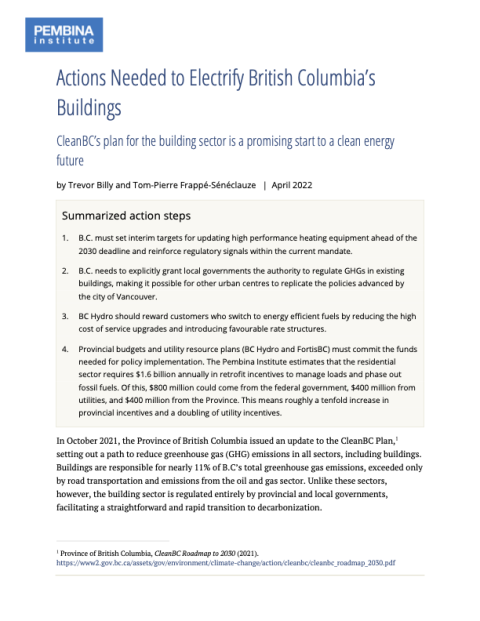In March 2021, the B.C. Electrification Road Map was released. The road map was developed from extensive consultation with a broad range of stakeholders. It provides a series of specific recommendations to governments and utilities on how to gradually replace fossil fuels and hot water heating with high-efficiency electrical heating in homes and buildings, in order to meet B.C.’s 2030 and 2050 climate goals.
The Pembina Institute is pleased with the updated CleanBC Plan the Province of British Columbia released in October 2021. It has adopted many of the recommendations made in the road map. Including a commitment to 100 per cent clean electricity by 2030; a mandate from BC Hydro to encourage customers to make the switch from natural gas to clean electricity for heating by making the process fast and easy; and a commitment to 100 per cent clean electricity by 2030. The province has also set a six megatonne carbon dioxide emissions cap on gas utilities; a reduction of 47 per cent below 2007 levels or the equivalent on removing 1.15 million cars from the roads for a year.
These commitments are a significant step forward. However, without political direction and significant increases in funding incentives from the province, utilities and the Government of Canada, the wave of deep retrofit renovations to existing buildings and the shift to more efficient electricity-powered new buildings will not occur, and as a result, B.C.’s net-zero commitments will fall short.
There are several additional recommendations from the road map, that should be adopted in order to ensure the groundwork for implementing these commitments is laid and the risks associated with implementation are addressed.
These recommendations include:
- Setting interim targets for updating high performance heating equipment ahead of the 2030 deadline and reinforcing regulatory signals within the current mandate.
- Explicitly granting local governments the authority to regulate GHGs in existing buildings, making it possible for other urban centres to replicate the policies advanced by the city of Vancouver.
- Rewarding BC Hydro customers who switch to energy efficient fuels by reducing the high cost of service upgrades and introducing favourable rate structures.
- Committing the funds needed for policy implementation in provincial budgets, and the utility resource plans for BC Hydro and FortisBC.
- Implementing a tenfold increase in provincial incentives and a doubling of utility incentives. The Pembina Institute estimates that the residential sector requires $1.6 billion annually in retrofit incentives to manage loads and phase out fossil fuels. Of this, $800 million could come from the federal government, $400 million from utilities, and $400 million from the province.
By adopting these recommendations, the province can ensure that the progressive commitments they have made in the CleanBC Plan, lead to on-the-ground action from all levels of government and utilities that can serve as a model for other Canadian jurisdictions to follow in meeting their own net-zero goals.











